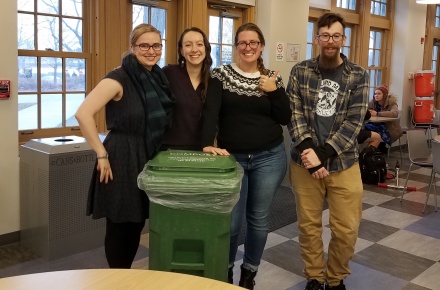Garrett-Evangelical Theological Seminary Continues Their Greening Journey
February 14, 2019

Currently, the seminary is in year two of a three-year Green Seminary certification program through the Green Seminary Initiative (GSI). Written by staff member, Liz Lwanga, the seminary’s latest initiatives were recently reported on the GSI blog.
The Green Seminary Initiative | By Liz Lwanga
I am eager to share an update with the broader Green Seminary Initiative community about Garrett-Evangelical Theological Seminary’s progress towards certification as a ‘Green Seminary’. We’ve got exciting projects in the works and our team has come up with innovative responses to the demands of the certification process. Below are a few of those solutions:
- Carbon Offsetting: Carbon offsetting can be a thorny practice. The market for carbon offsets suffers from an overall lack of regulation which poses challenges in ensuring that purchased offsets function as advertised. Additionally, the practice of purchasing offsets absolves the purchaser of moral guilt and can reduce incentives for behavior change
Our Green Team came up with a creative solution: the seminary would allocate financial resources towards a fund reserved for carbon reducing projects around our buildings and grounds. This practice will raise consciousness at the seminary about climate change and global warming, as well as jump-start seminary projects that will lower our carbon footprint.
- Composting and waste audit – We are currently working through a waste audit. Our two student members of the Green Team, Audra Hudson and Josh Richardson, have done an excellent job setting us up for success with research on our recycling processes, averaging our current waste estimates, and suggesting behavior changes to meet the certification standard of 25% waste reduction.
One of the ways we have already tackled this goal is by implementing composting at our weekly Community Meal. We started this early in the fall and have already composted an estimated 455 pounds just by introducing this practice at one major community event per week. A local company provides a 32 gallon tote every week and takes the organic waste to an industrial composting facility. We are working on expanding this procedure for spring.
- Low Carbon Game Night – Our two student leaders hosted several creative events last semester. Focusing on their fellow students, they put together a low carbon game night which included pizza, fellowship, and fun games. While it could have been advertised as simply ‘a game night’, uniting games and community building with a reduced carbon impact helps raise awareness among the student body and continues to bring this issue to the forefront.
- K-Cup Recycling – Coffee keeps our seminary running, and there are a few Keurig machines frequently in use on campus. We started working with Grounds to Grow On (www.groundstogrowon.com) last summer to recycle our k-cups in another effort to reduce our waste. This company composts the grounds and recycles the plastic and aluminum in each pod. So far, we’ve recycled almost 50 pounds of k-cups through this program.
Over the course of the certification process, it is truly evident that small steps add up over time and create a big impact, especially when done in community. I’m excited to share more progress down the road.
To learn more about Garrett-Evangelical and the sustainGETS initiatives, visit the sustainGETS webpage.
Garrett-Evangelical Theological Seminary, a graduate school of theology related to The United Methodist Church, was founded in 1853. Located on the campus of Northwestern University, the seminary serves more than 450 students from various denominations and cultural backgrounds, fostering an atmosphere of ecumenical interaction. Garrett-Evangelical creates bold leaders through master of divinity, master of arts, master of theological studies, doctor of philosophy, and doctor of ministry degrees. Its 4,500 living alumni serve church and society around the world.

